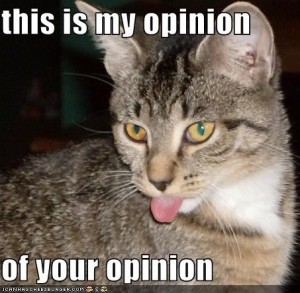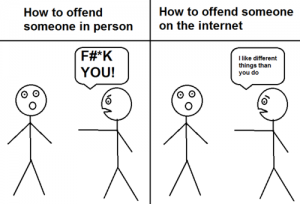(Andy Synn delivers the second part in a series that appears on no regular schedule and could disappear at any moment. Part 1 of this series can be located via this link. Your humble editor picked the images that accompany this post. Eventually Andy will learn to pick his own.)
I’ve been having some trouble getting myself together to write for the site recently. I’ve been busy with both bands, busy with work, busy with home-life… just generally busy. On top of that I just haven’t felt the inspiration to throw myself into reviewing properly. It’s no comment on the albums I have lined up – I have a couple of absolute stunners in the back pocket that have been on the back-burner for what seems like forever now – but just a lack of inspiration for the physical act of sitting down and just writing.
So, to try and break the cycle a bit, I decided to pen another column on the very act of reviewing itself. If I can’t write something, then by god I’ll write about writing something instead!
So, something of an unspoken fact of reviewing is that any review produced is, to an extent, simply an opinion. The thing is, I think this is something that does, now and then, need to be spoken about and discussed. I think not doing that has led to some misconceptions and mistaken assumptions about what reviews are, what they mean, and where they come from.
Now we here at NCS do try and balance objectivity/subjectivity in our writing, even going so far as to discuss and dissect albums informally with each other before, during, and after writing our reviews, just to make sure we’re not seeing the world through rose-coloured glasses.
 But, if anything, a review – a proper, well-written review – should be an informed opinion. It should offer more than just what the man in the street gets out of an album on a cursory listen. One of the things I’ve said to the other members of the NCS Elite Special Task Force On Elitism And Eliteness is that I’ve always appreciated how, in general, we try and put a fair bit of context into our reviews. It’s more important to discuss where the album stands – in its genre, in the catalogue of the band, in the music world at large – than it is to wax lyrical about how ‘sick’ the guitars sound.
But, if anything, a review – a proper, well-written review – should be an informed opinion. It should offer more than just what the man in the street gets out of an album on a cursory listen. One of the things I’ve said to the other members of the NCS Elite Special Task Force On Elitism And Eliteness is that I’ve always appreciated how, in general, we try and put a fair bit of context into our reviews. It’s more important to discuss where the album stands – in its genre, in the catalogue of the band, in the music world at large – than it is to wax lyrical about how ‘sick’ the guitars sound.
Problematically, not all reviews are that informed.
I’m going to stick to “proper” metal sites here, as it’s unfair to expect reviewers/staffers on general music blogs to come from quite the same sort of informed place as we “experts”, but often you get reviews wherein you find a lot of mistakes. A lot of strange interpretations. A lot of honest to goodness confusion about what an album, or a review, is meant to be!
You can usually tell the difference between an opinion and an informed opinion if you read closely enough. Here’s an example. I did not particularly care for either of the last Katatonia or Swallow The Sun albums, even though I am a long-time fan of both bands. I don’t think they’re terrible albums, I just didn’t think they stood-up in terms of quality and longevity against their predecessors.
An informed opinion might make reference to the context surrounding the album to better and more precisely place its criticisms:
“It’s less interesting than its predecessor. Though it re-uses many of the same underlying elements, it achieves less with them. Familiarity robs it of its impact.”
But a less informed opinion, one that’s easily challenged (and also easily ignored), would read something like this:
“It’s just not ________ [insert Heavy/Doomy/Metal, as needed] enough.”
See? Simple. Direct. But totally lacking in any context of justification. It’s simply an opinion thrown out into the void. You don’t know how it’s being judged or what criteria it’s being measured against.
And that is, to me, what separates an opinion, from an informed opinion. Giving readers the ability, even if they disagree with the review entirely, to see where it’s coming from. To make the logical connections and, to an extent, understand something about the reviewers themselves in the process.
 Now, remember when I said earlier that certain factors (including, but not limited to, unscrupulous, notoriety-seeking bloggers) have led to a series of misconceptions and mistaken assumptions concerning what the act of reviewing is all about?
Now, remember when I said earlier that certain factors (including, but not limited to, unscrupulous, notoriety-seeking bloggers) have led to a series of misconceptions and mistaken assumptions concerning what the act of reviewing is all about?
Well one unfortunate result of this has been to call down the omnipresent wrath of the internet-dwelling asshole.
You rarely see a comment thread these days without some pompous jerk going above and beyond the call of duty in order to question the writer’s right to share their opinion, to live, to breathe, to simply exist. If you’re really lucky you’ll get a few homophobic or racist jabs thrown in, just for effect.
Thankfully, we here at NCS don’t seem to attract that sort much – it’s rare that we get involved with a war of words with anyone, and even more rare that Islander has to bring the ban-hammer down to quell any serious unpleasantness. But still, we’ve all seen it, perhaps many of us have experienced it directly. How do you deal with it?
Largely we just ignore it here, although sometimes I can’t resist making a witty retort, or just calling people out on their bullshit. It’s probably not big, or clever, but it has at least led to some moments of amusement.
More important than this though is the question of where this antagonism comes from? At what point in your life do you decide that a band is so important to you that all common decency flies out the window the moment someone has the unmitigated gall to criticise them (justifiably or otherwise)?
When it comes down to it, what we really have here is a simple difference of opinion. One which, far too often, quickly escalates (hell, often starts off immediately) into mud-slinging and shit-stirring on an impressive level. But that’s all it is, a difference of opinion. Rather than questioning a writer’s parentage or sexual proclivity towards members of the animal kingdom, it’d be far more effective if these assholes would simply point out what was wrong with the review, how its information was wrong or skewed, in a careful and precise manner. They’d convince far more people and probably have a greater effect on the ethics and conduct of the site as a whole.
But it’s the internet, and people do so love drama. So instead of a discussion of dissenting opinions, we get people choosing sides and yelling at each other. Nothing is achieved and ultimately everyone comes out of it looking worse.
 So it seems that reviewers do have to take some responsibility for their own trolling. I’m not blaming the victim here though. What I’m saying is that years of sloppy reporting, biased reviews, and blatant hatchet jobs, have produced a public at large who often don’t trust reviews, or reviewers. But it’s a two-way street. And although there are always going to be morons who simply lack the capacity for a reasoned argument beyond calling you a “pussy” for not liking their favourite band, by and large the audience has to remain aware that a review is designed to present an opinion, hopefully well-informed, but not utterly definitive.
So it seems that reviewers do have to take some responsibility for their own trolling. I’m not blaming the victim here though. What I’m saying is that years of sloppy reporting, biased reviews, and blatant hatchet jobs, have produced a public at large who often don’t trust reviews, or reviewers. But it’s a two-way street. And although there are always going to be morons who simply lack the capacity for a reasoned argument beyond calling you a “pussy” for not liking their favourite band, by and large the audience has to remain aware that a review is designed to present an opinion, hopefully well-informed, but not utterly definitive.
So don’t take offence if someone says they don’t like an album.
Don’t fly off the handle.
Take a deep breath before you click send on that expletive-peppered comment you were just about to post.
And maybe, maybe, try engaging with the reviewers and discussing it with them.
If you’re polite to us, we’ll be polite to you.
And we might both just gain something from it.


Good points. I have to agree with you about reviewers inviting their own trolls. On one hand, I think it doesn’t really matter. No matter how well written and thought out, someone will come along and call you a “commie f*g junkie,” to borrow one of George Carlin’s lines. On one of the first reviews I did for metalbandcamp, someone mocked me for mentioning that the lyrics on one of the tracks were written in the second person. And if that makes someone angry, whatareyagonnado?
On the other hand, one thing that I find annoying is when reviewers respond to criticism (be it well written or more inflammatory) by throwing out, “I’m not a journalist/reviewer/writer, I’m a blogger.” Yeah, O.K., and I agree that there can be a difference, but I feel like that’s too often code for, “I don’t want to get called out for my b.s. or screw ups.”
The second person always drives me into an inarticulate rage.
I will add that, largely, I’m obviously speaking to the converted here, as our regular commenter-base are 99% awesome and respond with civility and decency, even when we fuck up (which is, of course, never).
So here’s a quick shout out to those who provide us with corrections, links, and further information, without beating us over the head with their intellectual superiority.
Oh, except that guy who tried to tell me that Lars Nedland didn’t perform at Inferno, even though there’s a wealth of physical evidence that he most certainly was there.
“You Obviously Don’t know shit about Doom or Chowder.”
That’s the only comment like that from the last year on my blog, so I’d say that’s pretty good. Anymore it seems like the negative comments are not made directly to me–usually they’re on the band’s Facebook page and consist of “You Obviously Don’t know shit” or “What do you expect from a Bible thumper?” Also, many of the regulars at the Metal Archives forum don’t care for me at all, but I think that’s a difference of review philosophy more than anything else.
I know a lot of people will criticize the dull technique of beginning a review with “My first encounter with this band was . . .” but the truth is, that’s an effective thing. A great review can give context and contrast, and doesn’t need to do ANYTHING else. Example: “I liked their last album, but this one drags on too long.” Or, “They sound like Band X playing covers of Band Y.” At MA they want lots of detail, and that’s fine, but most of the time people are going to figure it out from just that.
“Chowder”?
The kids cartoon or the food? Either way, seems to be something awfully petty to get so angry about
I had to Google that comment to find where it came from, and discovered your review, with this delicious opening paragraph — which sort of illustrates the point you were making in your comment:
“Let me paint you a picture: Three metal nerds sit around with a 2 liter bottle of Shasta, watch a few horror movies, smoke weed, and listen to Rush. They proceed to pick up their instruments, jam for a while, and maybe add some synthesizers in post. They call themselves Chowder–like the soup–because they obviously take themselves and their music quite seriously. The album they make, Passion Rift, is about as exciting and dangerous as that sounds. In all honesty, I could end the review right there.”
First thing that came to mind when reading this was a movie Black Circle Boys I saw years ago, they go on about forming a metal band through the whole movie, just on and on without ever doing anything, and then finally get to this scene where they actually ‘play’ – “we’re gonna be like fucking Deicide!” – but they can’t play for shit:
http://youtu.be/fSTG40pKovA?t=1m45s
One of the things that really burns my biscuits in internet discussion is when someone throws out the “well, opinions are just subjective, not facts”, thus bringing any deeper insight and analysis that could arise from dissenting ideas to a screeching halt. A movie critic I follow recently addressed this issue, and I found his comments rather poignant. Here it is praphrased and collected from his Twitter:
“Everyone is entitled to their opinion, but everyone is not entitled to their opinion being right. Obviously a lot more nuanced, but sometimes you need to articulate a hard line in the face of empowering relativism) hulk would argue that this relativism is false equivalency. Just because an opinion can never become a fact, doesn’t mean that some opinions aren’t more coherent, helpful, and productive than others. And thus to throw up your hands and chalk everything humans say up to a matter of druthers, is deeply unproductive. Awareness of subjectivity is good for the necessary amount of doubt. But it can’t be an independent philosophy / lifestyle. Subjectivity is why we have to listen to each other and not be 100% sure of own opinion. But it’s not what makes us all equally right. “
I love this.
Was that The Credible Hulk? One hasn’t actually ever read any of his reviews though.
Also, when I read the line “Rather than questioning a writer’s parentage or sexual proclivity towards members of the animal kingdom”, I immediately thought of Phro. You might have your opinions about the quality of the writing staff here, but I think it’s a pretty solid fact that there’s nothing quite like the collection of yahoos we got working here.
Can’t argue with that. Makes me proud to see it in print.
Great read. The reviews on this (really all the posts on this site) are so informative and well written it actually bothers me when I can’t make time to sit down and read them at my own pace and digest the words. Other “news feed” sites are fine for killing a few minutes, but NCS is actually worth a dedicated, focused read. It’s why I check in every day.
Yeah, my thoughts exactly. You know with NCS you’re gonna get a much more in depth approach rather than just a ‘look here, new album, here’s my thoughts in two sentences!’. I love the context and background, it really makes for a much greater appreciation of the wider genre.
As a sometimes writer (though mostly translator) I write reviews. I have loved reading reviews ever since my early teens. Picking up a magazine in a bookstore, scanning the reviews, the bylines and reading as fast as possible before the inevitable “this ain’t a library, son” from the owner. In fact, I would go so far as to say that reading reviews in this fashion helped develop my speed read/scanning skills which were put to good use at university.
I prefer reviews that have context. I like to read reviews by writers I have got to know over time. Though I don’t always agree with Full Metal Attorney (on a range of topics) I feel like I can trust his opinion. In a similar vein, I also prefer reviews that utilise metaphor in a meaningful (not meme-ingful) way. Inserting a release into a different context finding new ways to describe it and connect to a wider context.
One critical thing I have come to accept throughout my migration to the internet review is the “mean age” of the internet. In other words, I have reached a point where I am now likely older than most of the intended audience on most music and metal sites. When I see “herp derp” reviews or any counter-opinion longer than a one liner my speed reading skills go into overdrive. Or shut down. Whole slabs of BS just get glazed/skipped. As the cartoon above suggests comment/feedback sections seem to be a site for marrying insult to taste. Wait a minute, when did I go back to high school? Ultimately those marginal cries for health add little to a discussion and since I have virtually no relationship with such voices at all, can safely be ignored.
Anyway, NCS, thanks for the hard work. Looking forward to 2013, year of the Gorguts!!!
“Though I don’t always agree with Full Metal Attorney (on a range of topics) I feel like I can trust his opinion.”
This made me so happy you wouldn’t believe. That is exactly the kind of relationship I’m always trying to foster with anyone who reads my blog.